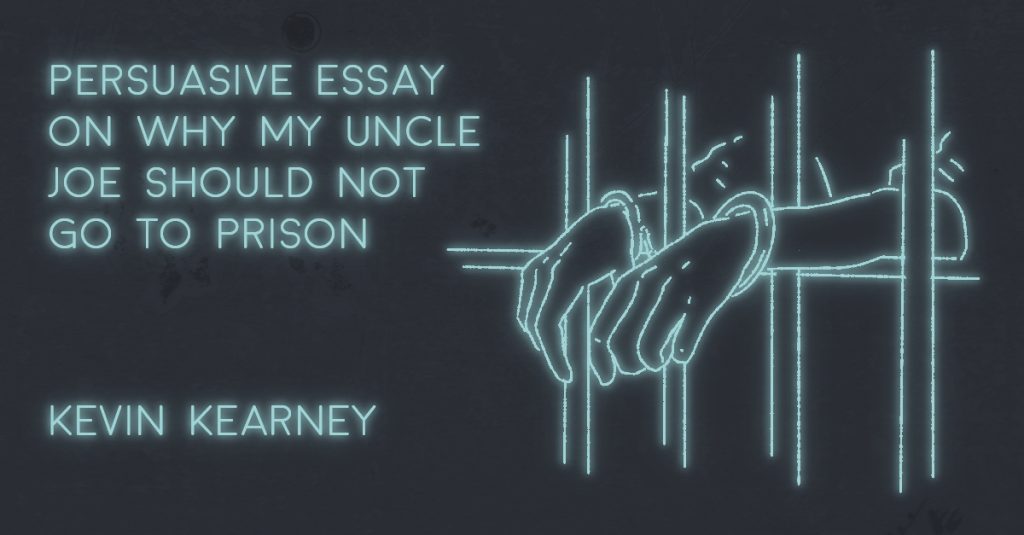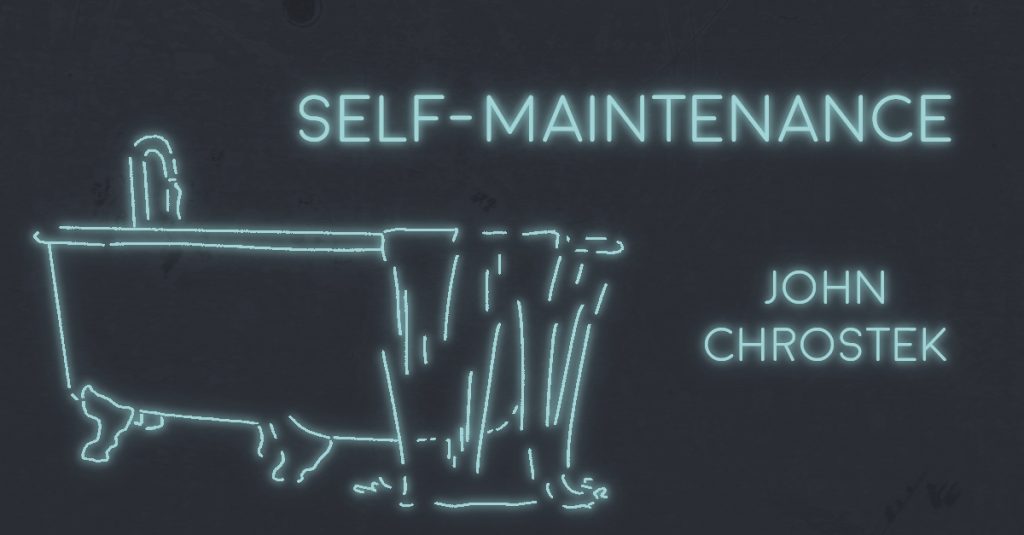

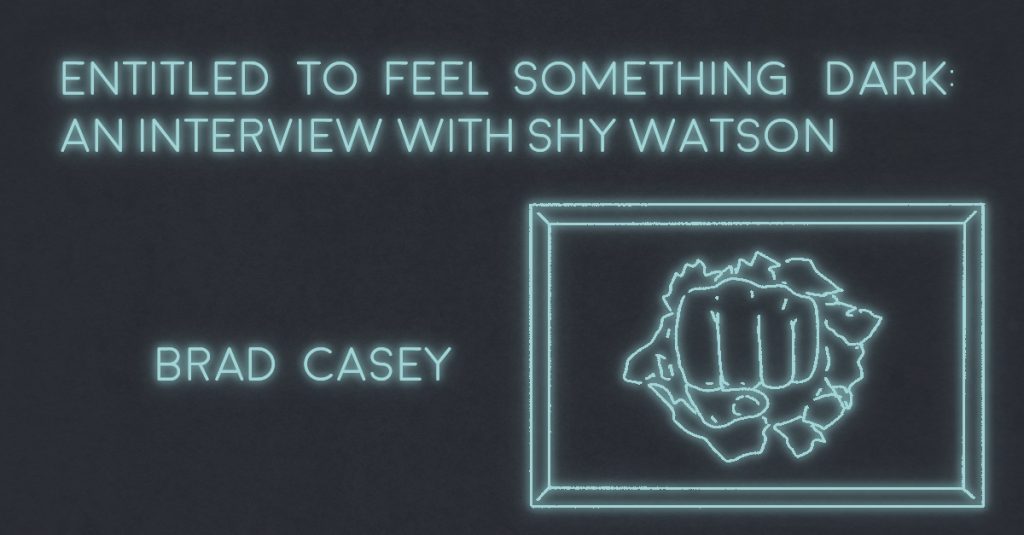
ENTITLED TO FEEL SOMETHING DARK: AN INTERVIEW WITH SHY WATSON by Brad Casey
The first time I met poet and writer Shy Watson was after a reading in Brooklyn I’d organized in the summer of 2019. I’d heard of Shy for years, admiring what seemed to me to be a prolific amount of published work; within three years she had published dozens of poems, reviews, interviews, four chapbooks and a poetry collection. She was somehow involved in all the independent presses and magazines I admired: Metatron, Wonder, Bottlecap Press, Ghost City Press, Peach Mag, and Hobart as well as running and editing her own press: Blush Lit. And her work was deserving of attention. It’s present, it’s wanting, it has a quality about it like a compelling detachment, it shows the reader a world enfolding like a tour guide, a world morally ambiguous with sudden bursts of love, romance, nostalgia, and violence. A world fully her own. It’s hard to take your eyes away.
I’ve been lucky enough since then to come in and out of New York, to hear Shy read and share her work, to share dinner and wine together with mutual friends. And isn’t that a big reason we publish poetry? To share work and have fun with other poets? To talk with other poets? So when I heard Shy’s new book Horror Vacui (House of Vlad) was coming out I was eager to read it, to talk to her about her work. Horror Vacui is written in three parts. The first section, the longest, is made up of the Horror Vacui poems. The second, Waking Dreams, is a series of prose poems in which the world shifts and turns without warning. The third, Quarantine Diaries, is a down-to-earth accounting of personal daily events in New York within six weeks near the beginning of quarantine. Through the entire book is a desire for experience, a deep dive into the inner world, and an attempt to catalog a world outside the self that refuses understanding.
Below is the interview we conducted a few days before Christmas, 2020, as Shy got home from taking a COVID test.
****
Brad Casey: Hey! How are you? Where are you right now?
Shy Watson: I'm good! I'm back in Brooklyn but begrudgingly going to Missouri tomorrow (hence COVID test).
BC: How did the COVID test go? And how has Brooklyn been feeling?
SW: The COVID test was fine. I got it done at one of the walk-in clinics here in Brooklyn. People here either go to ModernMD or CityMD, and the two are across the street from one another which creates a kind of rival business effect, like Pat's vs Gino's. The line took three hours, but they brought out hand warmers. They said they'd call within an hour if the test was positive, so it looks like I'm in the clear. Usually, they email results regardless of what they are within 15 minutes but they said the computers are down. Brooklyn has been good, all things considered. I've basically just been spending time with my new boyfriend and working on novel edits! I'm very fortunate to live with roommates who I love during this time.
BC: So I loved reading Horror Vacui. I'm wondering what were the conditions under which you wrote it. When and where did you write it? Was it all in Brooklyn? Was it all written this year?
SW: It was mostly in Brooklyn, yes. But the first twenty poems or so were written between Cheap Yellow's publication (February 2018) and one year ago. The majority of it was written in the past year, though. A few of them were written in Mexico, where I stayed for a month to work on a draft of my novel manuscript last January.
BC: I wonder if you find a difference in tone between the poems written in those spaces? Like what was written in Brooklyn before / after the pandemic started and also the poems from Mexico.
SW: I think so! I mean, I like the newer ones better, but it always goes like that for me. The end is a lot more prose-heavy, with the Waking Dreams & Quarantine Diaries, which was influenced by the fiction workshops I have been taking during the past year.
BC: Why did you decide to structure the book this way? With the Horror Vacui poems to start, followed by the (if you'd describe them this way) prose poems from Waking Dreams and then ending with the Quarantine Diaries? They all shared a tonal similarity I enjoyed, it made sense, but I'm wondering about that decision on your part.
SW: I feel like the poems serve as kind of appetizers for the prose. Like, they're short and fun and kind of ease the reader in. Or maybe I did it simply out of habit because the prose in Cheap Yellow was in the back. I wondered if I should try to lure people in with the best stuff first, but instead, I kept it pretty chronological.
BC: Oh interesting! Because the whole thing is strong but I felt really pulled in by the poems. Like for me, the poems felt like the main feature of the book. I especially felt pulled in by the desire for experience that was being communicated through them. It didn't matter what kind of experience the speaker was going for, there was just a desire for anything, anything exciting to happen good or bad. You know what I mean?
SW: Yeah definitely! Wow, how cruel of me to release it during quarantine... Horror Vacui: The FOMO Book.
BC: Not at all! I think that want for experience is so strong right now, it's great to see it reflected. Like these lines stuck out to me: “thinking about how if i / threw my fist into a Picasso painting / something exciting would happen.” I think we all want to throw our fist through a Picasso painting right now.
SW: Haha, truuuue. Especially after this new COVID relief deal.
BC: Do you find liberation in experience? And do you find yourself gravitating toward experience regardless of whether you think it will end well or badly?
SW: Yes! And, I do. I was actually talking about this with a friend the other day, how I don't mind bad (though not traumatic) experiences, so long as they're interesting. Sometimes bad experiences end up being really funny later, or they teach you something about people or your relative place in society. But good experiences are always nice, too! Honestly, I want it all.
BC: I feel similarly. And I think for me that comes in part from growing up in a small town very far away from any city then moving to a city as an adult. Which, you live in New York but grew up in Rogersville, Missouri and I looked it up and it's even smaller than my hometown. Do you think there's a connection there? Between experiencing a city as an adult who grew up in a small town, how you're more open to experience because it's still relatively fresh?
SW: That's an interesting theory! I remember my first time in New York, being on the subway and a Mariachi band got on board in full costume, the whole shebang, and everyone on the train was just staring at the ground or scrolling through their phones while I was giggling, taking pictures, and giving them money. Maybe there is something to the rural upbringing to urban living pipeline. My high school boyfriend calls me "the goth Kimmy Schmidt."
BC: I guess this touches on something else I wanted to ask you about: I feel like the speaker of the poems is more concerned with contextualizing the outside world within rather than projecting an inside world out. Especially with the lines, “i made a point to look / at the leaves by your gate / and to remember them / exactly as they were / and not as I hoped / they would be” There’s no pretension of projecting feelings onto the situation but the other way around, taking what is outside and making it into feelings inside.
SW: I think that's a goal of mine. I have a tendency to romanticize people, especially romantic partners, to idealize them and put them on pedestals. I think that poem in particular speaks a little to my awareness of that tendency, though. Like, it acknowledges the desire to romanticize me being dumped for the first time while in Brooklyn, sitting on a stoop, but the reality is that the leaves were ugly and kind of haphazardly stuffed in the chainlink. It was gross. And being dumped was gross. And the idiot I briefly dated was gross. Sometimes things aren't beautiful, which is a hard reality for me to accept, but I'm working to get there.
BC: One thing that popped up a couple times in the poems that, each time, had a definite feeling of inarguable beauty and romance was LA, like it felt like a fantasy ideal. What is it about LA that appeals to you to write about it in this way?
SW: I knew a boy at the time who wanted to move to LA, and his fantasy of it is very interesting to me. Though none of these poems are about Ben Fama, just look to his book, Fantasy, which has almost everything to do with LA! It's a phenomenon! And I love LA. My favorite place in the world is Jumbo's Clown Room. The backyards are loaded with fruit-bearing trees, and everyone looks like a movie star. Pomegranates just straight-up grow there! And the beach! And I love driving. Here I am now, just like that boy, going off about LA.
BC: I hear you! The little amount of time I spent there, everything was like spiritually warmer and bigger? And I kind of liked the superficiality of it. But I wanted to ask you about the violence in the poems as well. One of the blurbs for the book is by Eileen Myles who calls your poems, among other things, “a little violent.” I really liked the lines “i wear happily / my little bruises / like joyous moths,” especially in relation to the little violence of your work, how it’s not always destructive. In fact, it often feels liberating. How do you approach commonly perceived negative emotions like anger and violence and how it relates to your writing and your life?
SW: I've been reading Bataille lately, so it's hard for me not to think of violence as a thrill because of transgression, or its approach toward the edge. But I think that, in terms of my poems, the violence is directed inward. I tend to be self-destructive, which I do find liberating. It's like, "Fuck it, today sucks, I'm going to smoke a cigarette and order a dozen cookies from Insomnia." When I feel angry, I want to listen to angry music, not anything that will cheer me up. For me, it feels good to fully revel in whatever feelings I have, even if they are angry or violent. In a way it's anti-combative to give into "negative" emotions, rather than to fight or control them. It's a kind of emotional submission. If I'm feeling something dark, I feel entitled to it and I'm going to let it course through me until it's done.
BC: That said, when I read “Doomsday” (a tamale / turned fragile / in the cruel passage / of time) I wondered: Are you getting softer with age? Are you the tamale?
SW: You caught me! I think I am in ways. After my mom gave birth to me, my dad started crying to insurance commercials. I think I'm going through something similar. It takes a lot to make me angry. And for the first time in my life, I'm considering marriage.
BC: Whoa! That's a big step! What does marriage look like when you consider it?
SW: It looks... nice. Quarantine has caused me to get comfortable with a quieter lifestyle. I honestly love being in a secure, healthy relationship and I never want it to end. I just keep listening to 90's indie rock and daydreaming about moving to a small town for an MFA program. I loved partying in New York, but COVID's got me appreciating and desiring stability in a way that I never have before.
BC: I've been seeing that a lot, people in relationships that might have become vague in time are all moving in together and getting married. I think it's a big part of what we're going through.
SW: Maybe it's my Saturn return.
BC: On that note: I want to talk a bit about the Quarantine Diaries. It feels like making art in quarantine is extremely difficult because we still don't know how to contextualize this experience. You do a good job of it in the diary format here because the diary format, I think, doesn't necessitate making context of anything but the events of day. How do you feel about this section of the book? Is it a good representation of the month and a half in which you write? How do you feel about making art during the pandemic generally?
SW: I love the Quarantine Diaries because they speak to noticing beauty in the quotidian, which is all we really have right now. It was a good representation of that month and a half! I remembered what seemed important, and that's what I included. I feel like the pandemic is different for everyone creatively. Though I am not doing well financially, I have a lot of free time and a lot of emotional support from my roommates, my boyfriend, and my friends. I'm not immunocompromised or at risk of losing housing. Some people are though! Some people have kids who they have to get through online schooling. I don't know how they're doing it. But for me, I've been able to be productive. There's been ample time to work on creative projects, and there isn't much else for me to do if I'm staying inside.
BC: I heard someone say recently that they're not surprised that government has been so cruel and neglectful and monstrous! as they've been through this but to actually be here living through it, to see that monstrousness, it's amazingly fucked to experience it. Do you feel your work is political? You have one poem that overtly alludes to politics in "There is No Ethical Relationship Under Capitalism (after RRW)" but how do you feel your political beliefs play into your writing?
SW: I'm careful about politics because I don't want to speak to experiences that aren't my own. But as second-wave feminists would say: The personal is political. I can talk about my own conflicts with authority and the way that political structures impact my life, but I am scared to ever speculate about someone else's experiences or to write about them as if they're my own. I'd rather just listen and think through the roles that I play.
BC: These lines stuck out to me, regarding quarantine: “it’s a cold world that’s warming / where people stay inside / & confront their ghosts.” Has this been your experience in quarantine? Do you think, for those of us who are able to walk out relatively unscathed by COVID, this time will have a positive effect on us?
SW: Yes. I've learned a lot about myself, and have grown in many ways. I would of course prefer a world where millions of people weren't dying from a horrible disease, but I hope that those of us who are able to come out on the other side stronger do.
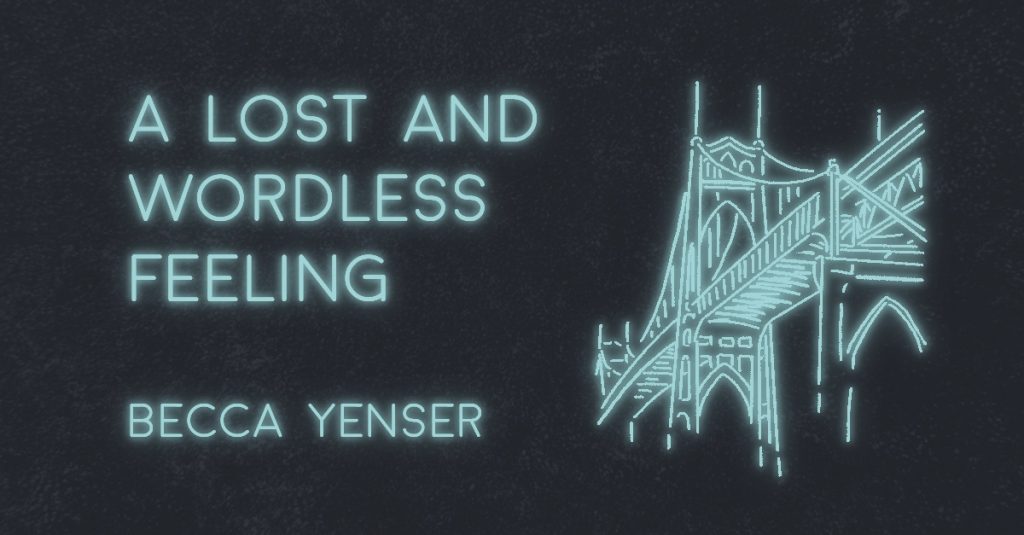
A LOST AND WORDLESS FEELING by Becca Yenser
for Abby Vasquez
All of our friends are dying but they are the ones to blame, so we shut up about it and sit outside at their old favorite bars, drinking set-ups until we puke. The bars are named after animals or phrases: Red Fox, Crow Bar, Haymaker, Lost and Found.
Our friends shot themselves in one-room apartments, jumped from bridges, hung themselves from garage ropes. They had dark hair, shiny hair, green eyes, red beards, brown eyes, dimples, scars, cellulite. They stooped when they walked, or danced on bikes, or wore layered sweatshirts instead of coats. They played drums, drank beer, bagged groceries, sat houses, or watched other people’s children.
Our friends killed themselves but told us about it first, for too long, first in the winters, then in the summers. Winter: bleak but soon over. Summer: swimming and cheap beer and too many Fourth of July parties. We listened, didn’t listen, stopped calling, called all the time.
Our friends had ideas. They liked Marx, they liked Beauvoir, they hated Ayn Rand or loved her. They liked Beavis and Butt-head and Cake and were in love with sad, sexy singers like Karen O. They spit when they talked, they had bad breath, they wore Gold Toe socks from Sears and Roebuck, or maybe just Sears.
One of our friends stepped off the St. Johns bridge but wore her red cape so that she looked like a capital A going down. Everyone tried to rescue her, or no one did, and we kept swimming, or stopped, or held our breaths, or breathed too much, or went silent, or said, Jesus, Jesus, Jesus when we heard the news, that all of our friends were dead.
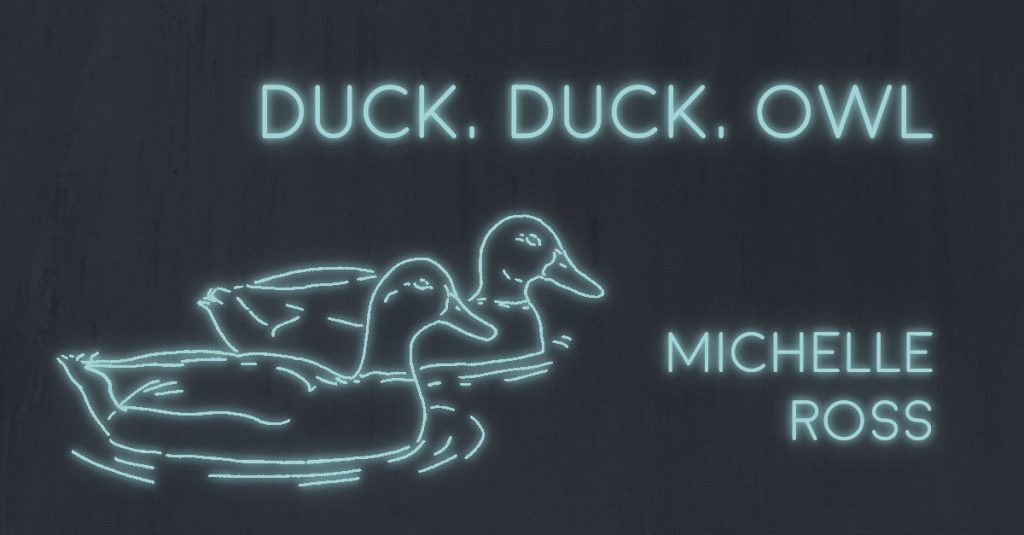
DUCK, DUCK, OWL by Michelle Ross
The ducks are a pair—Mallards from the pond in the nearby park. Every evening, they claim the shallow end of the swimming pool, float in languid circles. They’re not threatened by the woman watching them from the canvas chair. They don’t even startle when she goes inside the house to pour more prosecco.
The woman is a divorcée—she’s lived alone in this house twelve years. Her grown daughters transplanted thousands of miles away. Boyfriends have spent the night from time to time, but there’s no boyfriend now.
The woman notes the elegant (pompous?) curve of the ducks’ breasts and necks. The male duck, with his gaudy, iridescent green head that seems snatched from another body, looks like an Egyptian god. The female, with that snippet of blue sash peeking from her wing: a beauty contestant.
The woman imagines the ducks are her daughters. Some instinct they don’t understand draws them home each evening.
Of course, even if this were true, as ducks, they wouldn’t recognize this as home; they wouldn’t recognize the woman as their mother. Ducks know nothing of filial obligations, and this is to be expected. This is an acceptable trait for a duck.
But: duck shit. In the water. On the cement around the pool. The woman worries about diseases.
Also, on the phone, when her younger daughter calls to say she can’t visit that summer (she offers up excuses like items she’s trying to pawn to pay off an overdue bill—How much for this? How much for that?), she tells stories of duck multiplication. Two becomes fifteen then fifty. When the woman’s older daughter calls to reprimand her for the candy the woman sends her grandchildren in the mail, she says of the ducks, “You’re not doing them any favors, you know. The chlorine is bad for their skin. They’d be better off if you scared them away.”
The owl is plastic—made in China. It doesn’t even weigh a pound. But when the woman walks out the sliding glass door, the owl in her outstretched arms, the ducks fly away before she is even certain she wants them to.
That night, and for many days and nights after, the woman’s only company is the plastic owl. Even after she hides the owl in the cabinet with the fire extinguisher, she feels its eyes always. They never leave her.
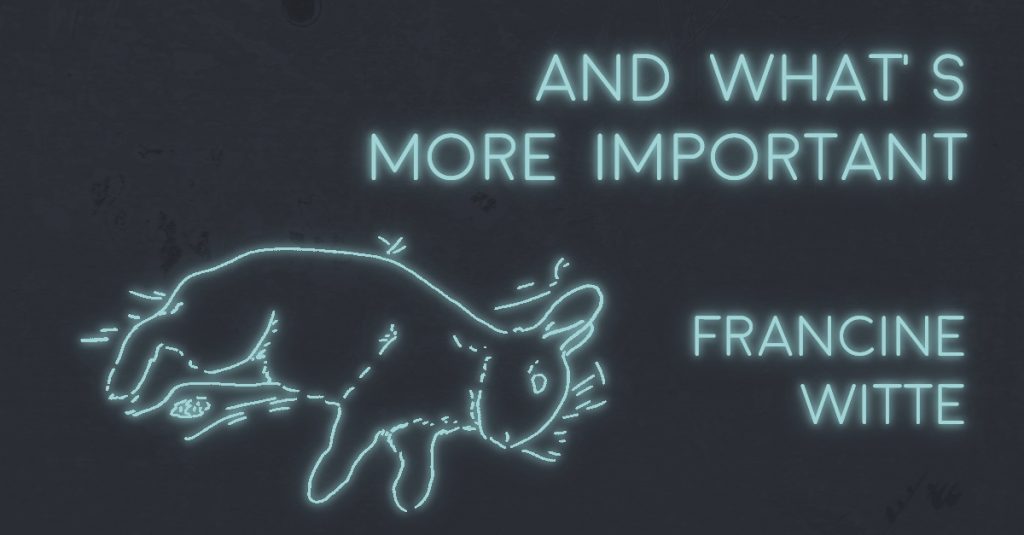
AND WHAT’S MORE IMPORTANT by Francine Witte
First time I met my brother, he was a hum in my mother’s swelling belly.
***
When he was 10 and me 14, we’d mock our parents’ arguments. We’d sneak up to the attic. He’d put on Dad’s soggy fedora and kick my bottom hard. When I flinched, he’d say, “hey, that’s how Dad does it.”
***
I remember the first dead rabbit. It was the winter it wouldn’t stop raining. Always on the edge of snow, but not. My father scowled at my brother, who was something like 11. “What’d you go and do that for?” He shook the dead fluffy thing at my brother over the dinner plates. “If you wanted to be useful, you could have killed a chicken.”
My mother tried to explain we could eat a rabbit. She said she’d put it right into a pot of water that very minute. The rain, a rattle at the window, and Dad throwing the rabbit straight through it, the sudden hole, the shattered glass, and puddle on my mother’s clean linoleum.
***
When my brother was old enough, first thing he did was join the army. He expected Dad would be pissed and was ready for it. Oddly, Dad just sank back into his armchair and fluffed up the newspaper. “It’s good,” Dad said, “you’re good at killing shit.”
My mother said, “There’s plenty to do in the army besides all that. There’s learning responsibility and how to be a good husband.” She stroked my brother’s shoulder. “And what’s more important than that?”
***
My brother didn’t get a military funeral. Deserter, or something. They cremated him, and my mother scattered most of his ashes into an aimless wind. “Now it’s like he’s everywhere,” she said. Dad, on the other hand, couldn’t even say my brother’s name without a snarl. “Best to forget a mess like that,” Dad said and never mentioned him again.
After that, my mother would sit up nightly, quietly, in Dad’s armchair. Dad would be upstairs snoring the whole house into a tremble. My mother would take out a tiny jar where she kept a handful of ashes she’d sneaked home with her. Some nights, I’d find her there, slumped into sleep, one hand on her belly, one hand on the jar, as if there were some way or other she could connect the two.
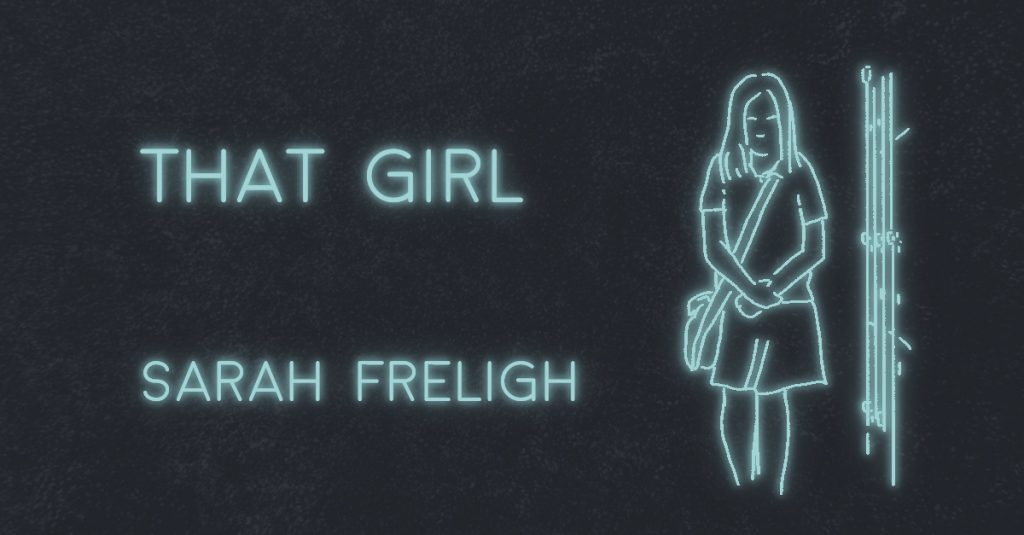
THAT GIRL by Sarah Freligh
we used to laugh at, the girl who walked the hallways head-down, cold-shouldered by lockers, who blistered her fingers twisting Kleenex into flowers for homecoming floats the cool girls would ride on, yeah, that girl
was nobody we knew until she went missing and then we remembered how in first grade she peed a puddle that spread and smelled of cheese and fish and scattered the class until the janitor showed up with a broom and a pail of red dust, remembered the Show and Tell in fifth grade when she shared the broken glass she’d found on the street and swore it was amber, remembered how some guys at our high school spray-painted her name across the stadium bleachers where they used to fuck her and how they laughed at her afterward
that girl
who will be winched-up blue and broken from a lake and live on forever as a yearbook picture on a TV screen, dust of blush, lipstick pinking her mouth, nobody we remember, that girl was nobody we knew.
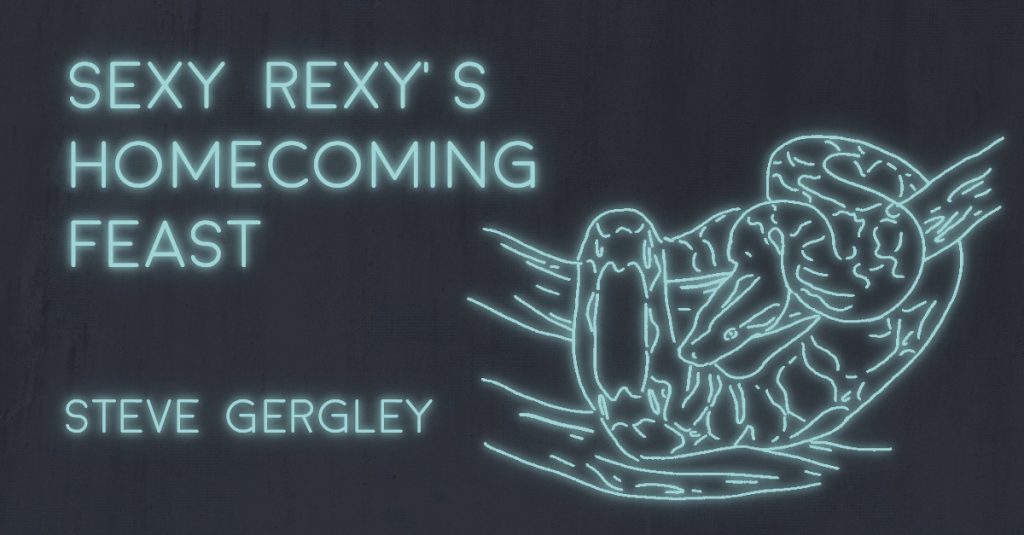
SEXY REXY’S HOMECOMING FEAST by Steve Gergley
For his fortieth birthday, Lance bought himself a red-tailed boa and named it Sexy Rexy. When he returned to his empty apartment, he masturbated to a video on Pornhub called “MASSIVELY JACKED STUD ANNIHILATES SUBMISSIVE TWINK.” Then he turned off his phone and set up Sexy Rexy’s living enclosure, feeding tank, and hide box. For dinner Lance ate an entire chocolate cake and washed it down with half a bottle of champagne. Then he smoked a pack of Marlboro Lights and threw up in the bathroom for half an hour. After a long, hot shower in which he threw up one more time and sobbed for ten straight minutes, Lance fed three mice to Sexy Rexy. The salesman at the exotic pet store had warned Lance not to feed Sexy Rexy more than two mice per week. But this was a special occasion. And besides, Lance thought to himself, rules are made to be broken. Before dropping the first pre-killed mouse into Sexy Rexy’s feeding tank, Lance held it by the tail and looked at its tiny legs dangling in the air. Then he named the mouse after a man he had known in the past.
He named the first mouse after the priest who got him drunk off sacramental wine at age eleven.
He named the second mouse after his father, who pushed his head through a window after walking in on him making out with the running back from the JV football team.
He named the third mouse after his college suitemate who od’d on xannys and vodka, the only man he had ever loved.
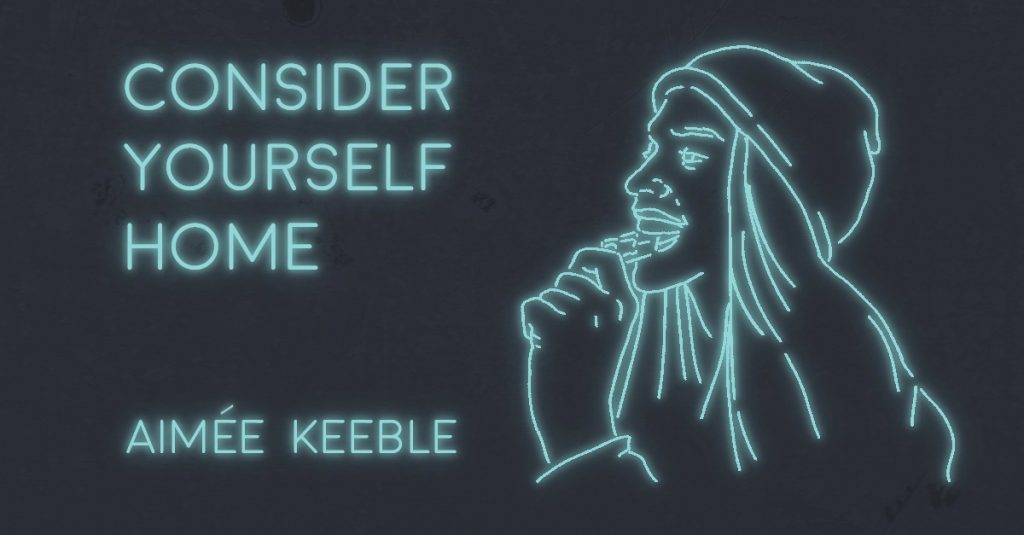
CONSIDER YOURSELF HOME by Aimée Keeble
You and I at the window with our bandit teeth all exposed. Mine tallow, yours anodizing with the stale gold of nicotine, crap coffee that lives petrified in a jar. I’m your artful baby and I slip into shops first and blast back my chest. Hiya! And you coyote low behind me scoping with your dull sly eyes. Side by side at a counter and you’re velvet and torn at the creases but I’m no better (no worse) and my shirt is soppy and sags, better to stuff the gaps with. We’re proud as we unwrap our sandwiches in front of the clean people behind the counter in their maroon uniforms, blameless and blood dark as cardinals. Why thank you, you pass me bread royally and your beard is tangerine with soap splatter. Have a sip of this fruity soda! And we crack aluminum and toast ourselves, tangling our wrists so we may drink from each other’s cup.
We hip-bump all the little cafes in Piccadilly, vulnerable as soft bovine things all white in the neck. Who would suspect us! As I pass you a chocolate bar right off the counter where the cash is moved around. We steal not because we are poor, or because we are hungry, we need to, as an act of frenzied paddling above this capitalistic floatsum, this accepted inhalation of the little and wild self. How are we to traverse the choke of a system which finger-flicks each vertebra as it commands: work and earn and the toil scrubs itself anew- an ouroboros exfoliation of fat cat/have-not SLAVE TO THE RYTHM (system).
I pop a chocolate-covered peanut into your moving lips and lean into your ear that I’ve got more sugar below my waistband. I re-cross my legs and the hidden jiggles.
When discovered:
Oh! But I thought you—
No, no I’m so sorry, I thought you had—
Our harmonizing laughter, we point at each other and yip. I eye your eye as our throats arch back.
And then we wait to see which weaker one of us today will cough up the money. More often times you, your back half crooked in a Fagan arch turning coins on the counter counting and I against your leg with all the nonchalance of a tiger.
Later, sated on salt and side by side in the cobbled streets, hands in our long coats. We with our swinging heads, sniffing the windows of Berwick Street, Frith Street, past the dancing girls on Great Windmill.
You knick me a novelty pepper shaker from a sex shop, half of the set, a pig on its hind legs reaching—caught mid-coitus now humping empty air. Its hard-pink body in my fist as we prowl on to Seven Dials. I scream at you darling, wait! And move into an astrology shop, coming back to you minutes later (just minutes!) and ask you what part of your kangaroo get-up can hold a star, what folds of you can I squeeze a bit of heaven into? Just a tarot card my love, the sun one. They were loose and I was quick.
London shakes herself and the rain sparks down. A green window, the one we love. The one our eyes pour light into. You hold the door for me and sudden sanctification—my avenging waist, the villain of me clatters as a broken blade. The bookstore, chapel in which we lower our heads. We keep our hands to ourselves here. With reverence, we pet the fatty spines, near exhausted from so many temporary thumbs. Like the rind of something reptilian, red, green, yellow—all unalloyed in their shelves. Lightly we sneak open their pages, careful of their columns. You are hunting but now you are an angel all in metal. I know you are looking for poems to read, aloud, quietly, the words will climax in my hair.
In the middle of the unboastful floor flayed bare by old sunlight I spin slowly. You, older than me by thirteen years, I wait to watch you (as you always do,) pull your own book from some obscure place into a more friendly view. Here, beside the great shuddering monster gullet of Soho, there is no trouble and I wait for you to show me.
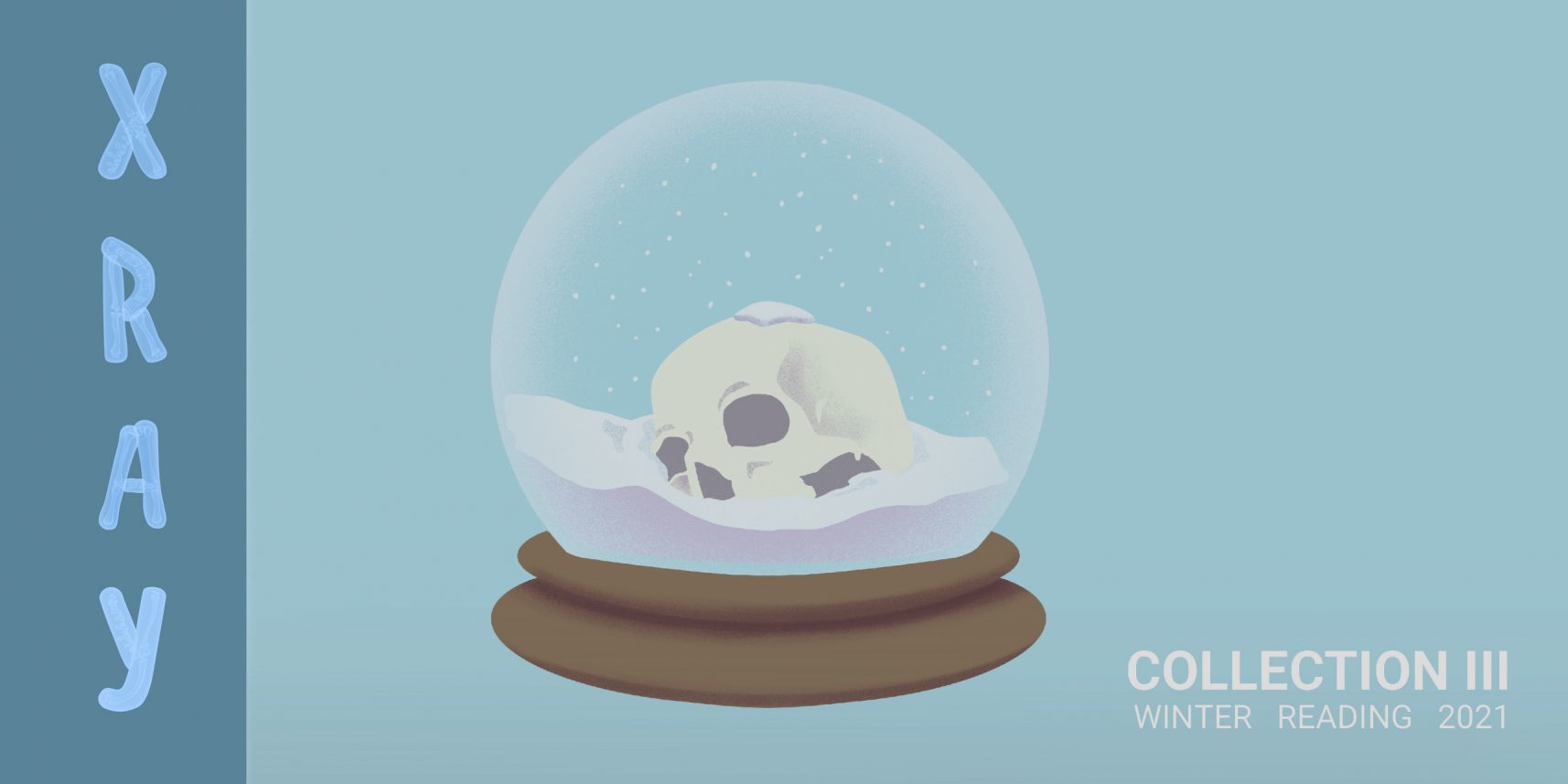
X-R-A-Y LITERARY MAGAZINE | COLLECTION III | WINTER EDITION
click for the PDF, or see some of the original pieces
